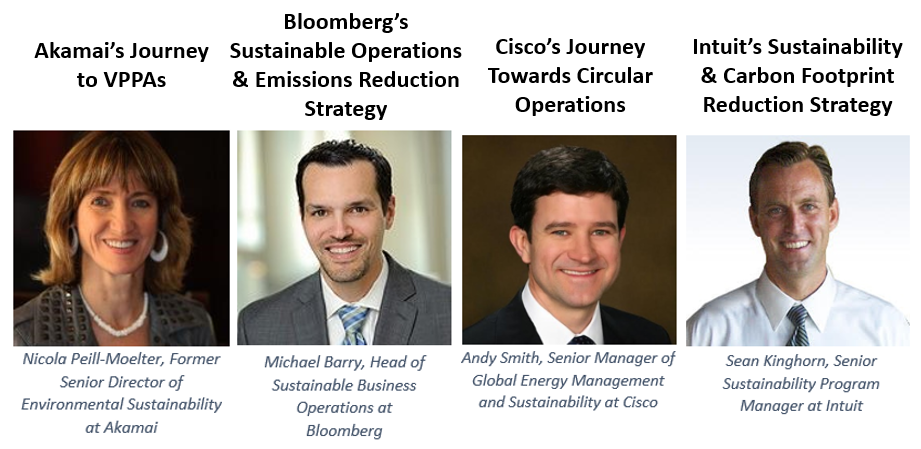This website uses cookies so that we can provide you with the best user experience possible. Cookie information is stored in your browser and performs functions such as recognising you when you return to our website and helping our team to understand which sections of the website you find most interesting and useful.
December 18, 2019
Renewable Energy & Offsets on the Journey to Net Zero Emissions
SR Inc’s 4th Quarter Symposium Includes Discussion on How Companies Can Commit to and Achieve Bold Sustainability Goals like Net Zero Emissions in a Cost Positive Manner
Following our post last week on the first half of the fourth quarter symposium in DC, this post reviews the second half of the meeting and how our Member-Clients are charting a profitable path to Net Zero Emissions. The discussion included a presentation of SR Inc’s new Member Briefing on Net Zero Emissions and new Member Advisory on Carbon Offsets from SR Inc COO David Osborn and updates from Sean Kinghorn, Global Sustainability Leader at Intuit, who received the Sustainable Business & Enterprise Roundtable (SBER) award for Outstanding Corporate Executive of 2019.

David Osborn first presented on the key takeaways from the latest SR Inc Member Briefing on Charting a Profitable Path to Net Zero Emissions, which was released to Member-Clients last week. The report stems from SR Inc’s experience with over 75 Member-Clients over multiple years and includes case studies from Member-Clients Akamai, Bloomberg, Cisco, and Intuit. Many of the reported developments have occurred in the past 36 months, so companies should seriously reexamine the possibility of committing to Net Zero Emissions. Additionally, Net Zero Emissions no longer just refers to scopes 1 and 2, it also includes suppliers and other scope 3 emissions. Key findings from the presentation include:
- Net Zero Emissions and 100% renewables have rapidly become a key corporate sustainability strategy, especially among fast-growth companies in the IT and service sectors.
- Key stakeholders increasingly ask for public commitments to long-term value creation strategies and standards setters increasingly require ambitious and Net Zero Emissions reductions goals.
- Companies should score and report their emissions and renewable energy strategies internally and externally and should have their C-Suites approve of goal setting and strategy.
- Leading companies first pursue energy efficiency and on-site renewables and then off-site green tariffs, community solar, and Direct PPAs, but VPPAs are often the most scalable solution. Buyer Organized Aggregated VPPAs enable smaller commitments that allow more companies to cause new renewable energy and spread risk across multiple transactions and both wind and solar.
- Leading companies, including SR Inc Member-Clients Akamai, Intuit, Cisco, and Bloomberg, are moving away from unbundled RECs and are embracing Buyer Organized Aggregated VPPAs to chart a profitable path to Net Zero Emissions.

David then spoke about the evolving role of carbon offsets to corporate Net Zero Emissions strategies based on SR Inc’s recent Member Advisory. Key findings include:
- Protocols & plans supporting the Paris Agreement, plus certifications like the Verified Carbon Standard & Gold Standard, have brought offsets global scrutiny & credibility
- The voluntary carbon offset market increased more than 140-fold in the last decade, largely in the Forestry & Land Use and Renewable Energy categories
- Companies should be weary of claiming carbon neutrality through offsetting alone, or risk facing claims of a “jumbo-size greenwash,” as Greenpeace claimed last month of EasyJet’s plan to offset flights
- CDP and the Science Based Targets Initiative encourage driving emissions reductions throughout companies’ value chains (e.g. IKEA announced in early December it would spend $110 million to support suppliers in switching to renewables and storing and removing carbon)

Sean Kinghorn, Global Sustainability Leader at Intuit, spoke about Intuit’s sustainability journey and experience with energy efficiency, renewable energy, carbon offsets, Net Zero Emissions, and Intuit’s new climate positive goal. After first establishing a baseline of the company’s environmental footprint and performing an initial stakeholder engagement process when Sean joined the company in 2014, his team got to work helping Intuit set aggressive 2020 sustainability goals. Intuit has been so successful in the few years since that it has had to set two new rounds of more aggressive goals.
Intuit’s strategy for meeting its sustainability goals relies on maximizing financial and emissions savings in leased spaces, procuring off-site renewable energy, and offsetting carbon emissions for employee business travel. In addition, Intuit created its Purely Green program, which offers renewable electricity to small business and residential customers across Texas. Intuit has also led beyond its own operations by helping suppliers, customers, and peers understand that by working together, they can address climate change while creating unprecedented business opportunities.
In September, Intuit made a public commitment to reduce carbon emissions 50 times greater than its own 2018 emissions footprint by 2030, choosing to use its scale and innovative abilities to promote emissions reductions well beyond its direct operations. Since making the climate positive goal public, Sean’s team has been impressed with the reaction from Intuit’s global employees and their commitment to the goal. Many are energized by the possibility of integrating sustainability into Intuit’s products, which could have catalytic double bottom line effects. Sean encourages fellow Member-Clients to not be afraid to set bold goals and to not be complacent with any existing renewable energy and Net Zero Emissions goals.
Sean finished his presentation by stressing the importance of working to collaborate with peers in new and important ways such as SR Inc’s Net Zero Consortium for Buyers, which facilitates Buyer Organized Aggregated VPPAs. For example, as he advanced Intuit’s interest in Aggregated VPPAs, representatives from SR Inc Member-Clients Cisco and Salesforce spoke with their counterparts at Intuit to convince them of the merits of the deal, which Intuit and Cisco signed with guidance from SR Inc’s Renewable Energy Procurement Services (REPS). In this largely pre-competitive space, sustainability professionals have the responsibility and privilege of leaning on each other to multiply their impact.

